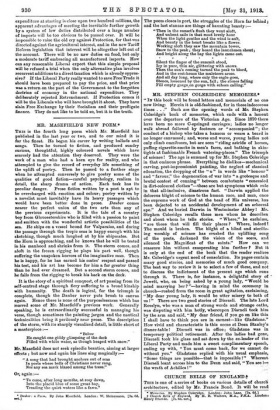MR. MASEFIELD'S NEW POEM.* THIS is the fourth long poem
which Mr. Masefield has published in the last year or two, and to our mind it is far the finest. He began his career by writing ballads and songs. Then he turned to fiction, and produced sundry curious, thoughtful, highly coloured novels which have scarcely had the attention they deserved. They were the work of a man who had a keen eye for reality, and who attempted to give the record of everyday life something of the uplift of poetry. Then he passed to a further stage when he attempted conversely to give poetry some of the qualities of good fiction—careful psychology, realism in detail, the sharp drama of action. Each task has its peculiar danger. Prose fiction written by a poet is apt to be overcharged with emotion and colour ; poetry written by a novelist must inevitably have its heavy passages which would have been better done in prose. Dauber comes nearer the perfect union of the two arts than any of the previous experiments. It is the tale of a country boy from Gloucestershire who is filled with a passion to paint and smitten with the wonderful artistic possibilities of the sea. He ships on a vessel bound for Valparaiso, and during the passage through the tropic seas is happy enough with his sketching, though much laughed at by his shipmates. But the Horn is approaching, and he knows that he will be tested in his manhood and shrinks from it. The storm comes, and aloft in the frozen rigging he plays his part well, though suffering the unspoken horrors of the imaginative man. Then he is happy, for he has earned his mates' respect and passed hia test, and his art has become for him a far greater thing than he had ever dreamed. But a second storm comes, and he falls from the rigging to break his back on the deck.
It is the story of a spiritual conquest, of art passing from its self-centred stage through fiery suffering to a broad kinship with humanity. The death is logical, for the triumph is complete, though the Dauber never puts brush to canvas again. Hence there is none of the purposelessness which has marred some of Mr. Masefield's previous work. Generally speaking, he is extraordinarily successful in managing his verse, though sometimes the painting jargon and the nautical technicalities bring it perilously near prose. The description of the storm, with its sharply visualized detail, is little short of a masterpiece :— "Below He caught one giddy glimpsing of the deck Filled with white water, as though heaped with snow."
Mr. Masefield does not seek episodic beauties, aiming at larger effects ; but now and again his lines sing magically :—
"A song that bad brought anchors out of seas In ports where bells of Christians never rang, Nor any sea mark blazed among the trees."
Or, again:—
"To come, after long months, at rosy dawn, Into the placid blue of some great bay, Treading the quiet waters like a fawn."
• Dauber : a rocin. By John MusefLeld. London: W. Heinemann. [38.6d. met.]
The poem closes in port, the struggles of the Horn far baind; and the last stanzas are things of haunting beauty :—
" Then in the sunset's flush they went aloft, And unbent sails in that most lovely hour When the light gentles and the wind is soft,
And beauty in the heart breaks like a flower.
Working aloft they saw the mountain tower,
Snow to the peak ; they heard the launchmen shout;
And bright along the bay the lights came out. • Silent the finger of the summit stood, Icy in pure, thin air, glittering with snows.
Then the sun's cominet' turned the peak to bleed, And in the rest-house the muleteers arose.
And all day long, where only the eagle goes, Stones, loosened by the sun, fall ; the stones falling
Fill empty gorge-on gorge with echoes calling."


















































 Previous page
Previous page